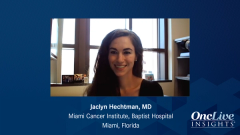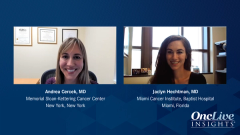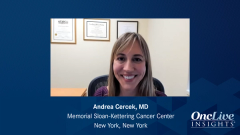
Challenges and Barriers to Colorectal Cancer Molecular Testing
Drs Hechtman and Cercek discuss how practice setting affects molecular testing options and the barriers patients face in receiving testing.
Episodes in this series

Jaclyn Hechtman, MD: When you request HER2 testing, how are you requesting it?
Andrea Cercek, MD: At the moment, we’re doing it with next-generation sequencing [NGS], so I typically get all the information back in a few weeks. We’re not routinely doing immunohistochemistry, although that will be part of our standard soon for advanced disease. As a pathologist, what has been your experience at Memorial [Sloan-Kettering Cancer Center] and now in Miami [Cancer Institute]? Do you see differences? What’s the real-world feeling? We’re sometimes spoiled in academic institutions because we have all this testing readily available.
Jaclyn Hechtman, MD: I’ve been in 3 practice settings: academics, industry, and now a community hospital setting. It’s interesting. In academics, we often have disease-management teams. In these disease-management teams, you decide what’s going to be refraction. A student pathologist says this is what I see under the microscope; it’s cancer. Then the team— radiologists, pathologists, oncologists, and surgeons—decide together that all these patients are going to get testing up front. That’s 1 way to do it. We have our refraction testing and pick a certain assay up front at these multidisciplinary meetings. The good thing about these refraction-testing methods is that no patients fall through the cracks. I see this, and it’s automatically done. It’s not as if a patient might miss testing somehow because something slipped through the cracks. That’s 1 good thing about refraction testing.
Other times, when tissue is more scarce—this might happen for small biopsies or psychology samples—the oncologists request them, rather than the pathologist automatically doing it. Because oftentimes pathologists are a little scared of ordering a test that’s not necessary, and then there’s nothing anything left in the paraffin block to do further tests. That’s another way of doing it. In the industry, a lot of the time the pathologist can order these piecemeal tests, but oncologists often order the big NGS panels. In the community [setting], instead of having everything available within the same in-house laboratory, the pathology laboratories are often smaller and you have more send-out tests. Let’s say you want HER2 [human epidermal growth factor receptor 2]–IHC [immunohistochemistry]. If it’s a practice of just a few pathologists, oftentimes they’ll send out for HER2-IHC. Or they’ll have the oncologists request whichever method they prefer, whether it’s NGS or HER2-IHC with refracts to FISH [fluorescence in situ hybridization]. You’re right: depending on the practice setting, that determines how testing is ordered. It’s definitely not standardized within our health care system.
Andrea Cercek, MD: It would be wonderful if it could be, but unfortunately not yet.
Jaclyn Hechtman, MD: What are some of the challenges and barriers to testing that you’ve seen for HER2?
Andrea Cercek, MD: In HER2 specifically, interpreting IHC and FISH and what’s positive, what’s actionable, and what’s the degree of expression. As I mentioned, when we use next-generation sequencing, it’s the time from ordering the test to obtaining the results. We often have to get the pathology slides, which takes time, and then we run it through our lab and get those results. Sometimes it’s a challenge because you need to make a treatment decision rather quickly. For example, in second-line therapy where HER2-targeted therapy is approved, we may not have those results back. This is why I was stressing that the earlier the test can be ordered, the better it will be for our future decision-making.
As a whole, outside academic institutions, it’s dissemination of this information that HER2 is an important target, and that it should be tested like MSI [microsatellite instability] for potential therapies and therapeutic interventions. That’s a big challenge and an important 1 that we need to work on. Ideally, we would have a universal test that we could all rely on, but that’s not where our health care is with several companies having different assays and institutions utilizing in-house tests or outside tests. Those challenges will exist, so it’s more on our side to educate the providers to order the best tests that are relatively quick and can be utilized to help treat the patient.
Transcript edited for clarity.






































